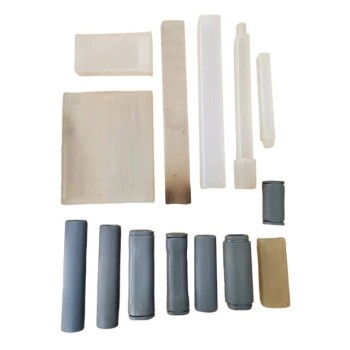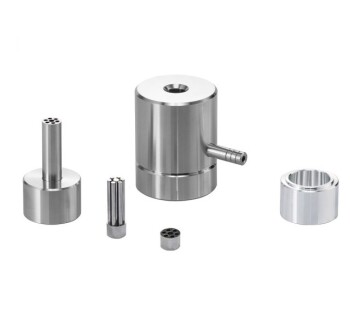In medical device development, Warm Isostatic Presses (WIP) serve a critical function by creating highly durable and precise components from powdered materials. By applying uniform pressure with a heated fluid, this technology consolidates materials into solid, dense forms, ensuring the reliability required for items like surgical tools and implants where structural failure is not an option.
The core value of Warm Isostatic Pressing lies in its ability to bridge the gap between Cold and Hot Isostatic Pressing. It provides just enough heat to improve material consolidation and create complex shapes without the extreme temperatures that could damage sensitive polymers or composites common in modern medical devices.

The Core Challenge: Material Integrity in Medical Devices
The standards for materials used within the human body or in surgical applications are exceptionally high. The manufacturing process must guarantee absolute perfection.
The Need for Absolute Reliability
Medical components, especially implants, must be biocompatible, resistant to corrosion, and capable of withstanding mechanical stress for years. Any internal voids, micro-fractures, or density variations can become points of failure.
The Problem with Traditional Manufacturing
Conventional methods like casting or machining can introduce internal stresses or fail to eliminate porosity in powdered materials. These imperfections are unacceptable risks in a medical context, potentially leading to device failure.
How Warm Isostatic Pressing Solves the Problem
WIP technology directly addresses the need for flawless, uniform components by combining pressure and controlled heat in a unique and highly effective way.
The Principle of Uniform Pressure
The term "isostatic" means that pressure is applied equally from all directions. A component, typically formed from powder and sealed in a flexible mold, is submerged in a liquid. A booster source then pressurizes this liquid, ensuring the component is compressed uniformly, eliminating voids and achieving consistent density throughout its structure.
The Role of Controlled Temperature
The "warm" aspect is the key differentiator. The liquid medium is heated to a precise, moderate temperature (typically below 400°C). This thermal energy makes the material particles more pliable, allowing them to bond more effectively under pressure than they would during Cold Isostatic Pressing.
Creating Complex Shapes with Precision
WIP is exceptionally efficient at producing "near-net-shape" parts. Because the powder is consolidated precisely into the shape of the mold, intricate designs common in orthopedic and dental implants can be formed with minimal need for post-process machining, saving time and reducing material waste.
Understanding the Trade-offs: WIP vs. CIP and HIP
Warm Isostatic Pressing is not a universal solution; it is a specialized tool chosen for specific material needs. Its value is best understood in comparison to its cold and hot counterparts.
WIP vs. Cold Isostatic Pressing (CIP)
CIP operates at room temperature and is used for basic powder consolidation. WIP is superior when working with materials that require some thermal assistance to reduce porosity and achieve higher final density, but cannot tolerate high heat.
WIP vs. Hot Isostatic Pressing (HIP)
HIP uses extremely high temperatures and pressures, making it ideal for achieving maximum theoretical density in robust materials like metals and ceramics. WIP is the necessary alternative for processing temperature-sensitive materials, such as polymers or certain composites, which would melt or degrade under HIP conditions.
The Key Limitation
The primary trade-off of WIP is that it may not achieve the absolute peak density possible with HIP for high-performance metals. However, for the specific class of materials it is designed for, it offers a level of densification and structural integrity that is simply not possible with other methods.
Making the Right Choice for Your Goal
Selecting the correct isostatic pressing method is crucial for balancing material properties with manufacturing constraints.
- If your primary focus is processing temperature-sensitive polymers or composites: WIP is the ideal choice, providing the benefits of pressure and moderate heat without causing material degradation.
- If your primary focus is achieving maximum theoretical density in metals or ceramics: Hot Isostatic Pressing (HIP) is the superior method, provided your material can withstand the extreme processing conditions.
- If your primary focus is simple consolidation of powders at room temperature with minimal cost: Cold Isostatic Pressing (CIP) offers the most straightforward and economical solution.
Ultimately, understanding these distinct manufacturing pathways empowers you to create medical devices with the precise balance of safety, durability, and performance required.
Summary Table:
| Aspect | Description |
|---|---|
| Function | Consolidates powdered materials into dense, precise components using uniform pressure and moderate heat. |
| Key Benefits | Eliminates voids and micro-fractures, achieves consistent density, and enables complex shapes with minimal waste. |
| Ideal for Materials | Temperature-sensitive polymers and composites that cannot withstand high temperatures. |
| Comparison | Bridges gap between Cold Isostatic Pressing (CIP) and Hot Isostatic Pressing (HIP) for specific medical applications. |
Enhance your medical device development with KINTEK's advanced lab press machines! Our automatic lab presses, isostatic presses, and heated lab presses are designed to deliver precise, reliable results for temperature-sensitive materials, ensuring biocompatibility and durability in critical components like implants and surgical tools. Contact us today to discuss how our solutions can optimize your laboratory processes and meet stringent medical standards.
Visual Guide

Related Products
- Lab Isostatic Pressing Molds for Isostatic Molding
- Automatic High Temperature Heated Hydraulic Press Machine with Heated Plates for Lab
- Automatic Heated Hydraulic Press Machine with Hot Plates for Laboratory
- Laboratory Manual Heated Hydraulic Press Machine with Hot Plates
- Heated Hydraulic Press Machine with Heated Plates for Vacuum Box Laboratory Hot Press
People Also Ask
- Why is the selection of a flexible rubber mold critical in the Cold Isostatic Pressing (CIP) process? | Expert Guide
- How does the hardness selection of rubber molds affect the molding quality? Optimize CIP Results & Avoid Cracking
- Why are flexible silicone rubber molds required for the Cold Isostatic Pressing (CIP) of salt preforms? | KINTEK
- What is the function of high-strength mold components in cold pressing? Build Stable Silicon Composite Electrodes
- Why are flexible molds essential for the compaction of TiMgSr powders? Achieve Uniform Density in Cold Isostatic Pressing



















